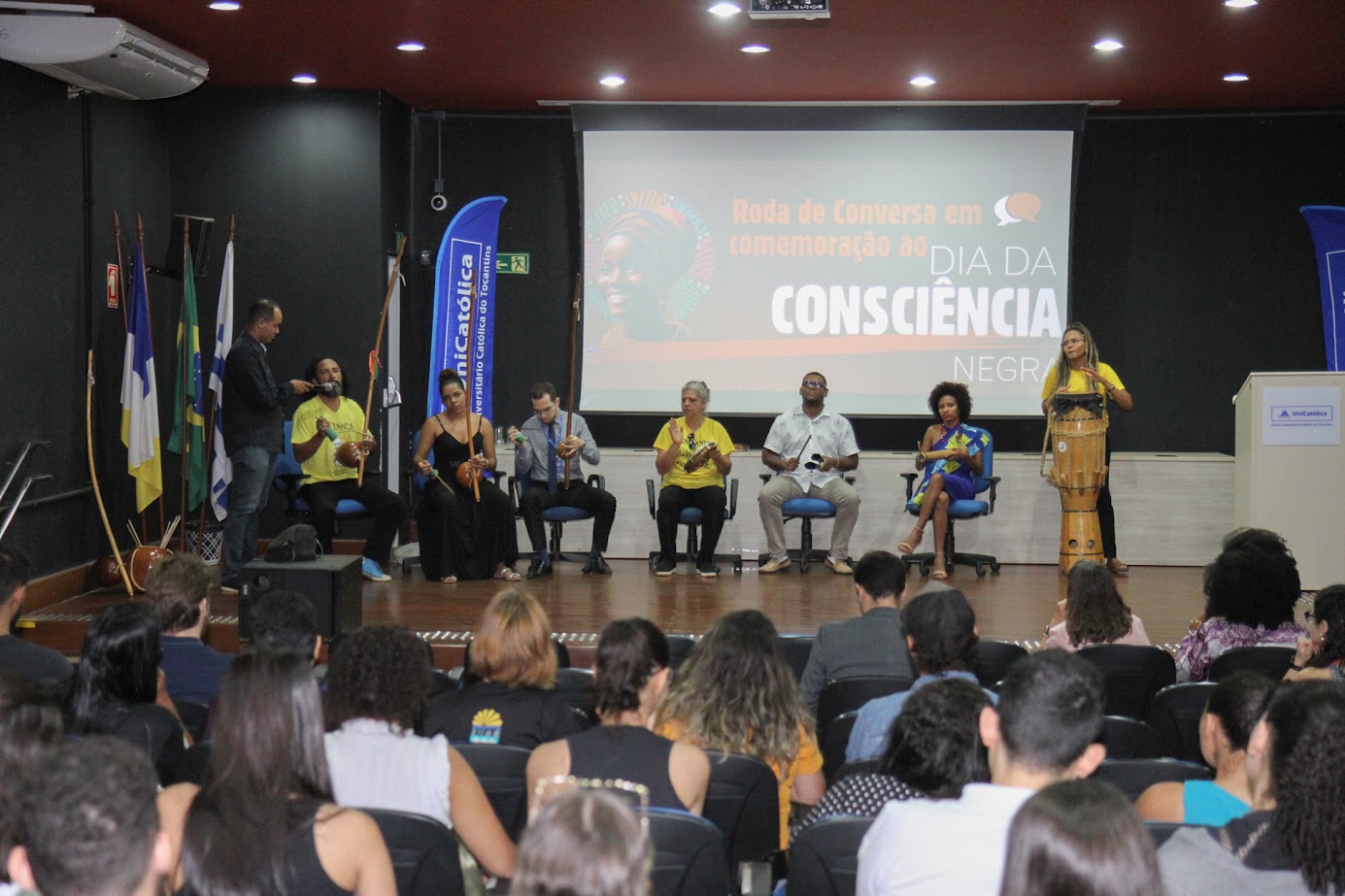
On Monday (November 20th), the Judiciary of the State of Tocantins fostered a conscious debate on Black Awareness Day. The event, held at the Catholic University Center of the State of Tocantins (UniCatólica), was attended by the academic community of the cities of Palmas and Miracema, representatives of public institutions and leaders of black collectives in the State of Tocantins.
The program is part of the Internal Affairs in the Universities project and it is an initiative of the General Internal Affairs of Justice of the State of Tocantins (CGJUS) in partnership with the Superior School of the Judges of the State of Tocantins (ESMAT), UniCatólica and the Association of the Magistrates of the State of Tocantins (ASMETO).
With a capoeira performance by the Only Angola Group of the State of Tocantins and a round table discussion on "Quilombos, the Judiciary, Racial Literacy and Institutional Racism", the event covered the main historical facts about the period of slavery in Brazil and its consequences, which still structurally affect the view of black people in our country. The legalization of quilombola land was one of the issues raised during the debates, given that the State of Tocantins has 48 communities without the necessary legal security.
"This agenda is a priority for us in 2024 and we're already working to move forward, with the drafting of the provisions that will regulate this whole process," said Justice Maysa Vendramini Rosal, the General Ombudsman, on the work of the Office of the Prevention of the Ombudsman and Land Regularization Center (Nupref/CGJUS).
Round table
With the theme about "Quilombos, the Judiciary, Racial Literacy and Institutional Racism", the round table discussion was attended by Quilombola leader Rita Gomes and a representative of the National Black Youth Collective (Enegrecer). The debate was mediated by Judge Renata do Nascimento e Silva, coordinator of the event.
Talking about the importance of the date, the magistrate expressed the need to combat racism through truly transformative actions and highlighted the importance of the initiative of the Judiciary to broaden the debate in order to promote racial equality. "In this way, we will create a fair, respectful, egalitarian environment with respect for differences and diversity," she said. "We can't believe that the discourse that we are all the same solves all the problems, because, firstly, we are not all the same, and our differences cannot disconnect us. Quite the opposite. They have to unite us in favor of a better path, of a free, fair and egalitarian society, which is what the Constitution stipulates; and we can't do that if we don't have racial equality in our spaces," she added.
Rita Lopes, leader of the Black River (Rio Preto) quilombola community, which is about 50 km from Lagoa do Tocantins, shared her experiences and challenges in the fight against racism and stressed the importance of having a space to debate the issue. "It's very important for us to be in these spaces, to be heard. So when the Court of Justice of the State of Tocantins opens this bridge, inviting us to be part of a panel like this, it's to listen to us. This is very important, not just for me as a quilombola, as a quilombola leader, not just for my quilombo, the Black River (Rio Preto) quilombo, but for all the quilombos in the State of Tocantins. So the space I occupy today is to bring a voice, to give a voice to the quilombola communities, and it's very important, and I want to thank you for the invitation. We leave here already with some ties or bridges built, and I hope that this will help my people even more," she said.
Diego Panhassutti, leader of the Blacken (Enegrecer) Collective, also contributed to the debate from his experiences and highlighted the need to promote the construction of critical thinking. "We know that talking about black consciousness in a country where the black population suffers the worst indices, the worst social demarcations and the worst jobs, where we still suffer the process of mass incarceration, where 7 out of 10 people are black and where we still see the process of a young black person dying every 23 minutes in this country, is more than necessary, it's urgent, it's latent so that we can create means and mechanisms to reverse this scenario. And spaces like this make us more engaged, stronger, and also bring as many people as possible into the anti-racist struggle," he said.
For Ingrid Karla da Nóbrega Beserra, a lecturer in the Social Work course at the Federal University of the State of Tocantins (UFT), Miracema campus, who took the students registered in the Social Work and Human Rights course to take part in the event, "building a reflection on black consciousness, understanding that racism is part of a structural system in the social-historical formation process of Brazil, is of the utmost importance for them [the students] to understand the importance of defending human rights in the profession, in society and, in the future, in their everyday workplaces. So they have to be present, they have to take part in these issues."
The regional superintendent of Labor in the State of Tocantins, Jalson Jácomo do Colto, also attended the debate and commented on his interest in the subject. "This is a topic that really interests me, not only from a legal point of view, but also from the perspective of the reality that these communities are experiencing. The Ministry of Labor can contribute in the sense of work, economic arrangements, the popular and solidarity economy," he said, making himself available to move forward in any way possible.




